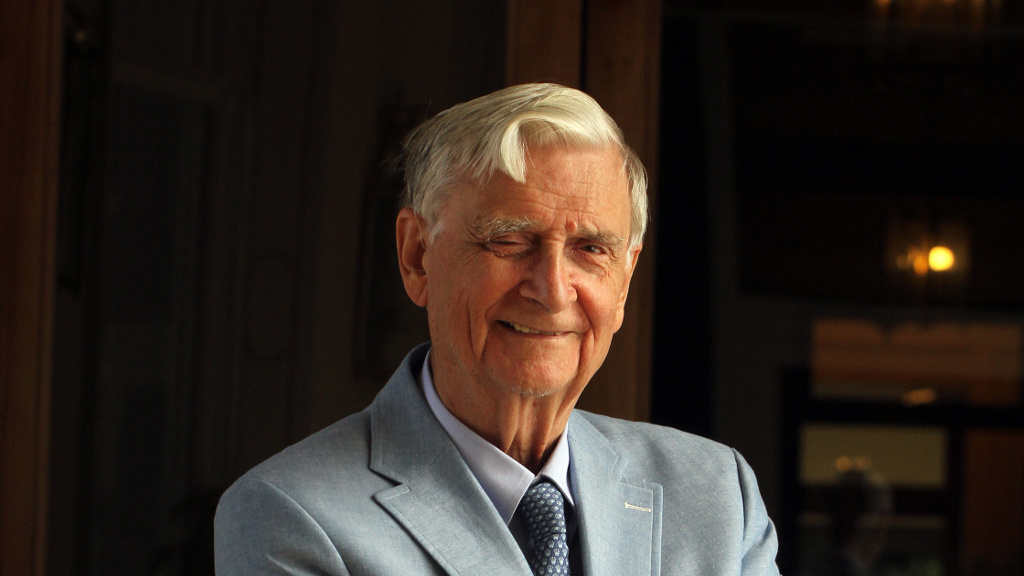
Edward O. Wilson, Frontiers laureate in Ecology and Conservation Biology, dies aged 92
Edward O. Wilson, winner of the Frontiers of Knowledge Award in Ecology and Conservation Biology in the 3rd edition (2010), has died at the age of 92. Professor Wilson, emeritus professor at Harvard University (USA) and the Harvard Museum of Comparative Zoology, was hailed by the award committee in its citation as “one of the most influential thinkers of our time, an exceptional biologist and a world-class natural historian.”
27 December, 2021
Wilson “coined and popularized the term ‘biodiversity’, and has contributed much to making our society aware of its value,” in the words of the Frontiers committee. His seminal contributions, it continued, started from something as concrete as the study of ants: “His career in science has expanded on his life-long fascination with the biology of ants to permeate all of ecology and conservation biology.”
Indeed “Lord of the Ants” was a soubriquet often pinned on Wilson. His passion for these insects, dating from his earliest childhood, led him to fundamental contributions not only in biology but also in the social sciences. Hence Wilson – commonly referred to as a naturalist and humanist – became the founder of sociobiology, the discipline inquiring into the biological bases of human conduct, and won the Pulitzer Prize on two occasions: in 1979 for On Human Nature and in 1991 for The Ants.
As an entomologist, he was the first to describe the social behavior of ants and other social insects. He also succeeded in deciphering the “chemical language” they use to communicate and plan their routes, and in demonstrating the action of pheromones. This work was also at the root of his island biogeography theory, developed in the mid- 1960s with Robert MacArthur and considered a fundamental tool for the design of conservation strategies.
Regarding his many contributions outside the strictly biological arena, the committee remarked that his writings “have linked human culture to evolutionary ecology.” His books Sociobiology and Consilience “provided a firm basis for the new discipline of evolutionary psychology that is currently revolutionizing fields as disparate as anthropology, linguistics and history.” The concept of consilience rests on the idea that the sciences, humanities and arts are not isolated branches of knowledge, but together convey, in Wilson’s own words, the message that “the world is orderly and can be explained by a small number of natural laws.”
A “culminating award”
“This, for me, is a culminating award”, said Wilson on being informed of the committee’s decision. “It is a very substantial prize in view of the stature of the committee and its worldwide reach. But also because it recognizes the advancement of knowledge in the broadest sense. We are now in an age where the greatest need is for synthesis, the ability to take all the discoveries made in science to create a more unified body of knowledge. That seems to me to be what the BBVA Foundation is recognizing.”
Wilson saw some cause for optimism in that “the idea of biodiversity is now everywhere”, but called for more effective action to conserve it. “I have to say that the public and politicians are insufficiently aware of the importance of biodiversity.”
Bio notes
“Most children go through a phase of being fascinated by bugs; I guess I never outgrew mine,” wrote Wilson in his book Naturalist. And indeed his entomological passion came to him at an early age. At nine, he undertook his first expeditions at the Rock Creek Park in Washington, DC, at thirteen, in Alabama, he discovered his first colony of fire ants and at eighteen, he took the decision to become an entomologist. After earning a biology degree at the University of Alabama, he obtained his doctorate from Harvard University, to which he remained associated throughout his career.
Author of 433 technical articles and 24 books, as well as editor of another seven, he won the Pulitzer Prize on two occasions: in 1979 for On Human Nature and in 1991 for The Ants. Besides these winning publications, his best known books are his autobiography Naturalist, along with Sociobiology, The Diversity of Life, Consilience: The Unity of Knowledge and The Future of Life. Other titles like The Social Conquest of Earth (2012), Letters to a Young Scientist (2013) or The Meaning of Human Existence (2014) reached the best-seller lists since they were first published.
Wilson held honorary doctorates from forty universities and received the National Medal of Science from the U.S. government, the International Prize for Biology (Japan) and the Crafoord Prize of the Royal Swedish Academy of Sciences, to name just a few of the 130 awards honoring his professional achievements.

